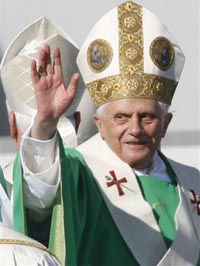Vatican condemns writings of Spanish theologian
The Vatican on Wednesday condemned as "erroneous or dangerous" some of the writings of a well-known champion of liberation theology, but took no immediate disciplinary action against the priest involved.

It was the first such move under the nearly two-year papacy of Pope Benedict XVI, who as Cardinal Joseph Ratzinger led the Vatican's crackdown on theologians judged to be perilously straying from Church doctrine.
The Vatican began building its case against the writings of Spanish Jesuit the Rev. Jon Sobrino in 2004, calling the procedure "urgent" because of the wide diffusion of his works in Latin America.
The judgment by the Congregation for the Doctrine of the Faith "deals specifically with the works, not with the person," Vatican spokesman Federico Lombardi told reporters.
He said it was the congregation's "duty to explain what was found erroneous in the writings, and thus to alert the faithful."
"Other sanctions, such as whether the person could teach or not is an open question to be dealt with by the competent authorities," Lombardi said.
The Vatican declaration, called a Notification, effectively serves as a caution to Catholic faithful who may read Sobrino's work, though it does not specifically forbid them to do so. It was signed by American Cardinal William Levada, head of the congregation, and carried Benedict's approval.
Sobrino did not plan to make a public comment on the Vatican decision, said Rev. Jose De Vera, a spokesman at Jesuit headquarters in Rome.
"Sobrino says that his faith is the faith of the Roman Catholic Church, but he expresses it in less traditional ways," he said.
The Vatican has objected to liberation theology, citing its basis in Marxist analysis of society _ particularly the idea of class struggle in the promotion of social, political and economic justice for the poor.
During his two-decade tenure at the congregation's helm, Ratzinger, who is a theologian, worked to cripple support for the "liberation theology" movement that is especially popular in Latin America.
Sobrino has been based in El Salvador for decades and was close to the Salvadoran archbishop Oscar Arnulfo Romero, an insistent critic of human rights abuses in the country. The churchman was slain in 1980 while celebrating Mass.
Lombardi, himself a Jesuit, said that six of Sobrino's fellow priests were murdered for their "social commitment with the Salvadorian people."
The Vatican singled out two of Sobrino's theological works, "Jesus the Liberator: A Historical-Theological Reading of Jesus of Nazareth" and "Christ the Liberator: A View from the Victims."
It said the works "contain propositions which are either erroneous or dangerous and may cause harm to the faithful."
Although it expressed support for his work for "the poor and oppressed," the Vatican accused Sobrino of distorting the nature of Christ -- in particular the core belief of Christianity in his divinity, reports AP.
Lombardi said that several of Sobrino's positions put into question "very basic points of the Church's permanent faith."
Subscribe to Pravda.Ru Telegram channel, Facebook, RSS!


